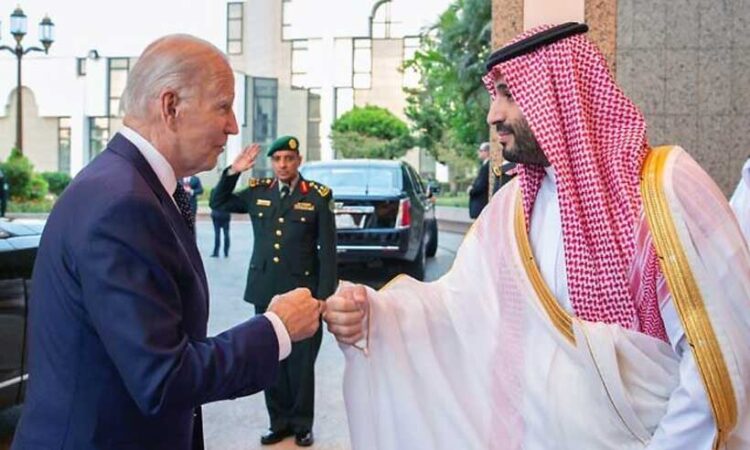
The Saudi-Russia oil alliance has the potential to cause all kinds of trouble for the US economy — and even for President Joe Biden’s re-election campaign. This month’s OPEC+ decision to cut crude output, for the second time since Biden flew to Saudi Arabia last summer seeking an increase, may be just the start.
Just three years ago, when OPEC+ oil giants fell out, the US found itself playing the role of peacemaker. Now it looks more like their target, Bloomberg notes.
That April 2 announcement has lifted oil prices by about $5 a barrel. OPEC’s own projections show that the cuts will widen the supply shortfall later this year. That means inflation will be higher, and recession risks are bigger than they otherwise would have been — because consumers spending more on energy will have less cash left for other stuff.
But more significant is what the OPEC+ move says about the likely path of oil prices over the coming years.
In a world of shifting geopolitical alliances, Saudi Arabia is breaking away from Washington’s orbit.
The Saudis set oil production levels in coordination with Russia.
When they wanted to ease tensions with regional rival Iran, they turned to China to broker a deal — with the US left out of the loop.
Western influence over the oil cartel, in other words, is at its lowest point in decades.
And the OPEC+ members all have priorities of their own, from Saudi Crown Prince Mohammed Bin Salman’s ambitious plans to reinvent his economy, to Putin’s Victory in Ukraine. Any extra revenue they get from charging more for oil is a help.
Asked about US concerns that OPEC+ has twice elected to cut production since President Biden’s visit to Saudi Arabia, a State Department spokesperson said the administration is ‘focused on holding down domestic energy prices and ensuring US energy security.’
Meanwhile, the threat of competition from US shale fields, a deterrent to price hikes in the past, has receded. And while there’s a global effort to reduce fossil-fuel use — and higher prices will accelerate that effort — the dash to drill in the last year shows that the ‘zero-carbon economy’ remains more long-term aspiration than short-term driver.
For the global economy writ large, lower oil supply and higher prices is bad news. The major exporters are the big winners, of course. For importers, like most European countries, more expensive energy is a double blow — dragging on growth even as inflation rises.
For decades, the US-Saudi “oil for security pact” has been a pillar of the energy market. Now it’s wobbling.
Symbolized by the 1945 meeting between President Franklin D. Roosevelt and King Abdul Aziz Ibn Saud, aboard a US cruiser in the Suez Canal (photo), the deal gave the US access to Saudi oil in exchange for guaranteeing the Kingdom’s security. But the Pact is no longer what it once was.
In 2018, Washington Post columnist and Saudi dissident Jamal Khashoggi was assassinated in Istanbul.
In 2019, Biden — then a presidential candidate — threatened to turn Saudi Arabia into a ‘pariah state’ and halt arms sales.
In 2021, early in his presidency, Biden released an intelligence report assessing that Crown Prince Mohammed, the kingdom’s de facto ruler, was responsible for the Khashoggi assassination.
In October 2022, OPEC+ lowered oil production by 2 million barrels a day — less than three months after Biden flew to Riyadh seeking an increase. The White House blasted the move as “short-sighted.”
Last month, Saudi Arabia and Iran agreed to restore diplomatic ties in a deal brokered by China and signed in Beijing.
The Saudi government has also agreed to join the Shanghai Cooperation Organization – a group with China and Russia at the helm, and seen as a rival to Western institutions — as a “dialogue member”.
In the aftermath of the April 2 move, Saudi officials said it was motivated by national priorities rather than any diplomatic agenda.
“OPEC+ has succeeded now and in the past in stabilizing oil markets, and contrary to claims by Western and industrial states this has nothing to do with politics,” former Saudi oil ministry adviser Mohammad Al Sabban said, according to ‘Asharq Al-Awsat’ newspaper.
In the past, OPEC+ was often torn: it wanted high prices, but worried that they’d attract more competition, particularly from US shale oil. But the dilemma barely exists now.
Rising US wages and inflation have increased the cost of shale production, leading to slower output growth. And firms are prioritizing the distribution of profits to shareholders rather than investing them into expanding production.
Saudi oil is cheap to extract. And the kingdom only needs prices at $50-$55 a barrel to fund its imports and offset remittance outflows. But it requires a higher price of $75-$80 to balance the budget — and even that doesn’t tell the whole story.
Saudi Arabia has an expensive social contract with its citizens, promising prosperity in return for political acquiescence. To keep its side of the deal, the government needs to invest in its non-oil industries — which employ most Saudis. Petrodollars pay that bill.






